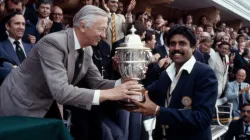On this day in 1983: Remembering India's famous World Cup triumph that changed cricket forever
On this day in 1983, Kapil Dev-led Indian cricket team stunned the defending champions West Indies at Lord's to clinch the World Cup and that changed the dynamics of Indian cricket forever. So, let's remember how India fought against the odds to claim the ultimate glory in the 1983 World Cup.

The cricket world witnessed history when India stunned West Indies to lift the ICC Men's Cricket World Cup trophy on June 25, 1983. Kapil Dev-led side fought against all odds, both on and off the field, to write the first chapter of Indian cricket's rise.
After registering just one win in the opening two editions of the Cricket World Cup in 1975 and 1979, the Indian cricket team entered the 1983 edition in England and Wales unnoticed. India were drawn with two-time defending champions West Indies, mighty Australia and debutant Zimbabwe in Group B.
India declared their intentions in the very first game against West Indies with a statement 34-run triumph at Old Trafford in Manchester. Many reported the result as a one-time upset as India lost against Australia and West Indies in the following games.
Kapil Dev's heroics with a bat against Zimbabwe kept India alive in the race for the semifinal but very few considered them to secure a top-two finish in their group. In their last group-stage game against Australia, India shocked the world with a huge 118-run win. It was not a fluke as India displayed utter dominance with both bat and ball in a 60-over game in Chelmsford to enter the semifinals.
England and Pakistan progressed to the final four from Group A with the former being drawn against India. Reaching the semifinal for the first time was itself an achievement for India but the players and fans at home were clearly not content with it and first time dreamt of a never-seen-before glory.
India were forced to work hard to overcome the English challenge at Old Trafford. Kapil Dev picked three wickets and Roger Binny dismissed both openers to bowl out England to 213 in 60 overs. India lost both openers with just 50 runs on the scoreboard but Yashpal Sharma and Sandeep Patil scored brilliant fifties and Mohinder Amarnath added a crucial 46 runs to help India chase down a target with six wickets remaining. A win boosted India to the finals which sent shockwaves throughout the cricket world.
In the final, India once faced West Indies who were looking for a hat-trick of World Cup triumphs. India lost the crucial toss at Lord's and were forced to bat first against the Caribbean's famous pace bowling attack. India lost the veteran opener Sunil Gavaskar on just two runs but Mohinder Amarnath and Kris Srikkanth added 57 runs for the second wicket to keep the game balanced.
Malcolm Marshal and Andy Roberts brought West Indies back in the game with timely wickets to bowl out India to 183 in 54.4 overs. Srikkanth top-scored with 38 runs as West Indies bowlers proved their superiority once again. Defending 183 against Vivian Richards-led batting unit was always going to be a tough job but Indian bowlers kept their hopes high.
Balwinder Sandhu dismissed opener Gordon Greenidge early in the innings and Madan Lal toppled West Indies batting attack with three big wickets to put India in the driving seat. Vivian Richards fought back for the West Indies but Kapil pulled off a memorable catch to stun both the batter and the defending champions.
After the impressive show with a bat, Mohinder Amarnath displayed his bowling skills with three late wickets to bowl out West Indies to 140 and that moment changed Indian cricket forever.
India went on to qualify for the semifinals in the next edition in 1987 to continue their rise as a potential dominant force in world cricket. After 1983's glory, Indian cricket never witnessed a notable fallout and witnessed more glory in the 2007 T20 World Cup and 2011 ODI World Cup. India ended Australia's dominance in the early stages of the 21st century to become the no.1 team in the ICC rankings across all three formats in recent years.